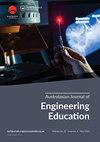Applying Cynefin framework to explore the experiences of engineering educators undertaking ‘emergency remote teaching’ during the COVID-19 pandemic
Q1 Social Sciences
Australasian Journal of Engineering Education
Pub Date : 2022-01-02
DOI:10.1080/22054952.2021.2020958
引用次数: 2
Abstract
ABSTRACT Higher Education Institutions around the world are all facing the challenge of delivering coursework online. Following a decade of evolving online education options, in 2020 ‘Emergency Remote Teaching’ emerged as an accelerated intervention to enable the rapid implementation of wholly online coursework delivery during the COVID-19 crisis. There is ongoing uncertainty about how to ensure quality offerings in such online learning environments, to meet national and international programme accreditation requirements. The authors undertook an exploratory study of engineering educator experiences with online curriculum delivery during the COVID-19 crisis. The Cynefin framework was used to conceptualise a structured narrative for considering the institutional context likely to be present in a given crisis, to then provide a pathway for educators to consider curriculum delivery options where the pedagogical tools must be changed but the underlying desired competency development remain unchanged. Semi-structured interviews with educators were conducted to help appreciate the spectrum of challenges faced in one university. Synthesising the findings, we present a summary of ERT concerns and opportunities to support educators in rapid curriculum renewal during times of crisis. We conclude the significant opportunity to replicate this study’s exploration with a larger sample size, to manage online curriculum renewal going forward.应用Cynefin框架探讨工程教育工作者在COVID-19大流行期间进行“紧急远程教学”的经验
世界各地的高等教育机构都面临着在线授课的挑战。在经历了十年的在线教育选择发展之后,2020年,“紧急远程教学”作为一种加速干预措施出现,使在2019冠状病毒病危机期间能够快速实施完全在线的课程交付。如何确保在这种在线学习环境中提供高质量的课程,以满足国家和国际课程认证要求,目前仍存在不确定性。作者对新冠肺炎危机期间工程教育工作者在在线课程交付方面的经验进行了探索性研究。Cynefin框架用于概念化结构化叙事,以考虑在给定危机中可能存在的制度背景,然后为教育工作者提供一条途径,以考虑必须改变教学工具但潜在期望的能力发展保持不变的课程交付选择。对教育工作者进行了半结构化访谈,以帮助了解一所大学面临的各种挑战。综合研究结果,我们总结了危机时期支持教育工作者快速更新课程的ERT关注和机会。我们得出结论,这是一个重要的机会,可以用更大的样本量来复制这项研究的探索,以管理在线课程的更新。
本文章由计算机程序翻译,如有差异,请以英文原文为准。
求助全文
约1分钟内获得全文
求助全文
来源期刊

Australasian Journal of Engineering Education
Social Sciences-Education
CiteScore
6.40
自引率
0.00%
发文量
8
 求助内容:
求助内容: 应助结果提醒方式:
应助结果提醒方式:


